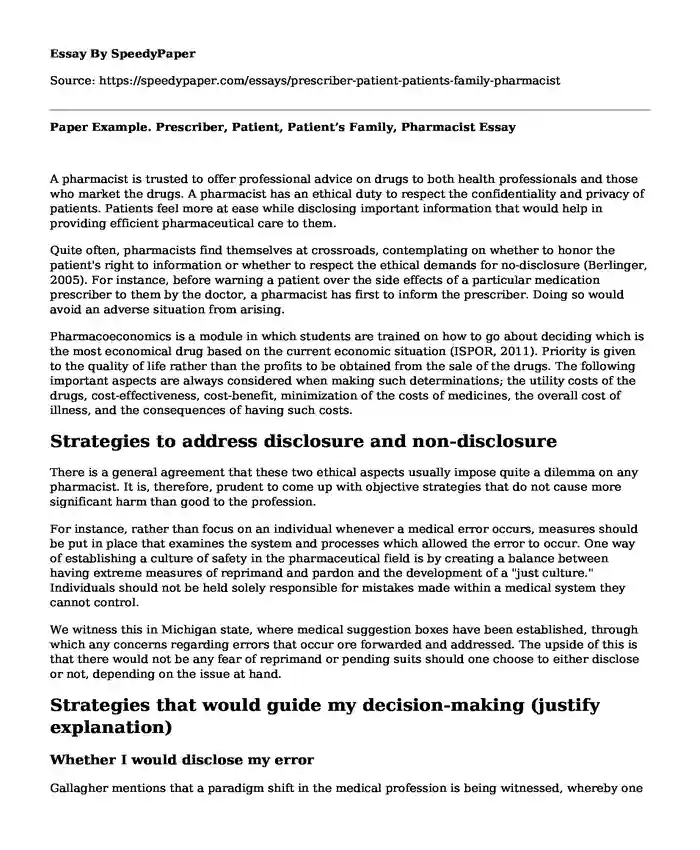
| Type of paper: | Essay |
| Categories: | Medicine Pharmacology Drug Public health |
| Pages: | 3 |
| Wordcount: | 793 words |
A pharmacist is trusted to offer professional advice on drugs to both health professionals and those who market the drugs. A pharmacist has an ethical duty to respect the confidentiality and privacy of patients. Patients feel more at ease while disclosing important information that would help in providing efficient pharmaceutical care to them.
Quite often, pharmacists find themselves at crossroads, contemplating on whether to honor the patient's right to information or whether to respect the ethical demands for no-disclosure (Berlinger, 2005). For instance, before warning a patient over the side effects of a particular medication prescriber to them by the doctor, a pharmacist has first to inform the prescriber. Doing so would avoid an adverse situation from arising.
Pharmacoeconomics is a module in which students are trained on how to go about deciding which is the most economical drug based on the current economic situation (ISPOR, 2011). Priority is given to the quality of life rather than the profits to be obtained from the sale of the drugs. The following important aspects are always considered when making such determinations; the utility costs of the drugs, cost-effectiveness, cost-benefit, minimization of the costs of medicines, the overall cost of illness, and the consequences of having such costs.
Strategies to address disclosure and non-disclosure
There is a general agreement that these two ethical aspects usually impose quite a dilemma on any pharmacist. It is, therefore, prudent to come up with objective strategies that do not cause more significant harm than good to the profession.
For instance, rather than focus on an individual whenever a medical error occurs, measures should be put in place that examines the system and processes which allowed the error to occur. One way of establishing a culture of safety in the pharmaceutical field is by creating a balance between having extreme measures of reprimand and pardon and the development of a "just culture." Individuals should not be held solely responsible for mistakes made within a medical system they cannot control.
We witness this in Michigan state, where medical suggestion boxes have been established, through which any concerns regarding errors that occur ore forwarded and addressed. The upside of this is that there would not be any fear of reprimand or pending suits should one choose to either disclose or not, depending on the issue at hand.
Strategies that would guide my decision-making (justify explanation)
Whether I would disclose my error
Gallagher mentions that a paradigm shift in the medical profession is being witnessed, whereby one is required to be open with patients regarding the errors they may have made. I would disclose my mistake to the patient. I have an ethical obligation to disclose any errors I may have made, as this culture of transparency facilitates the safety of the patient. Besides, opting for non-disclosure would mean putting my interests above that of the patient (Mastroianni, 2010).
In disclosing the error, I would acknowledge to the patient that I did make a mistake and proceed to offer an honest apology. A patient often believes that pharmacists tend to hide their undoing; as such, this would help establish trust. Further, I would assure the patient of the steps that have been taken to ensure that the error does not repeat and that corrective action has been put in place already.
Process of writing prescriptions and strategies to minimize medication errors
Medical errors have proven to be the leading cause of death in the United States (Kohn and Donaldson, 2000). To avoid such occurrences, it is prudent to ensure that a correct entry of the prescription has been entered. It does not harm to check and confirm that you have captured the right medicine. Pharmacists ought to be aware of drugs that resemble each other.
It is essential to have an organized workplace, where you can easily access the drugs. While writing prescriptions, avoid any distractions. Take time to arrange and store the drugs appropriately. Provide adequate counselling to the patient to allow the patient to raise any concerns they may have.
References
Berlinger N, Wu AW. Subtracting insult from injury: addressing cultural expectations in the disclosure of medical error. J Med Ethics. 2005; 31:106–108.
Gallagher TH, et al (2006). Choosing your words carefully: How physicians would disclose harmful errors to patients. Archives of Internal Medicine, 166:1585- 1593.International Society for Pharmacoeconomics and Outcomes Research (ISPOR), 2011. Brief Definition of Pharmacoeconomics, at, http://www.ispor.org/Terminology/Default.asp
Kohn LT, Corrigan JM, Donaldson MSIoM (2000). To Err is Human: Building a Safer Health System (Washington D.C.: National Academy Press).
Mastroianni AC, et al. (2010). The flaws in state apology and disclosure laws dilute their intended impact on malpractice suits. Health Aff; 29(9):1611-9.
Spath, P. Reducing errors through work system improvements. In: Spath P, ed. Error Reduction in Healthcare. San Francisco, CA: Jossey Bass;199–234.
Cite this page
Paper Example. Prescriber, Patient, Patient's Family, Pharmacist. (2023, Aug 24). Retrieved from https://speedypaper.com/essays/prescriber-patient-patients-family-pharmacist
Request Removal
If you are the original author of this essay and no longer wish to have it published on the SpeedyPaper website, please click below to request its removal:
- Free Essay Example on Mel Gibson's Mental Illness
- Essay Example Describing Self-Stigma and Social Stigma
- Free Essay: Efficacy And Safety Of Low-Molecular-Weight Heparin After Knee Arthroscopy
- Free Essay: Real-life Ethical Dilemmas
- Bob: The Travel Nurse Who Assists All Patients- Essay Sample
- Essay Sample on Covid-19 and its Effect on the Tourism Industry
- Free Essay Sample: Efficacy of the New Covid-19 Vaccine
Popular categories




